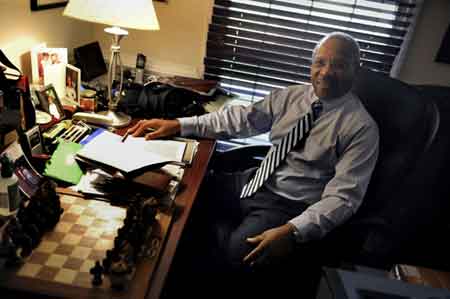 |
|
"I didn't just want to go back to the agency [as a contractor] as so many people do," said Mel Gamble. The 40-year CIA veteran worked for a Herndon-based defense contractor. |
|
In the decade since the attacks of Sept. 11, 2001, private intelligence firms and security consultants have peeled away veterans from the top reaches of the CIA, hiring scores of longtime officers in large part to gain access to the burgeoning world of intelligence contracting. At least 91 of the agency’s upper-level managers have left for the private sector in the past 10 years, according to data compiled by The Washington Post. In many quarters in Washington, government officials decamp for the private sector as a matter of course. Defense consultancies routinely hire generals retiring from the Pentagon; the city’s lobbying firms are stacked with former members of Congress and administration officials. But the wave of departures from the CIA has marked an end to a decades-old culture of discretion and restraint in which retired officers, by and large, did not join contractors that perform intelligence work for the government. It has also raised questions about the impact of the losses incurred by the agency. Veteran officers leave with a wealth of institutional knowledge, extensive personal contacts and an understanding of world affairs afforded only to those working at the nation’s preeminent repository of intelligence. Among the CIA’s losses to the private sector have been top subject-matter experts including Stephen Kappes, who served as the agency’s top spy in Moscow and who helped negotiate Libya’s disarmament in 2003; Henry Crumpton, who was one of the CIA’s first officers in Afghanistan after the Sept. 11 attacks; and Cofer Black, the director of the agency’s counterterrorism center on Sept. 11. The exodus into the private sector has been driven by an explosion in intelligence contracting. As part of its Top Secret America investigation, The Post estimated that of 854,000 people with top-secret clearances, 265,000 are contractors. Thirty percent of the workforce in the intelligence agencies is made up of contractors. Those contractors perform a wide range of tasks, among them assessing security risks, analyzing intelligence and providing “risk mitigation” services in foreign countries. Some of the officials quoted for this report spoke on the condition of anonymity because of the sensitivities involved in discussing the agency’s inner workings. Few of them cited problems at the agency as their reason for leaving. Rather, they said, the choice was often financially driven. (Read by Nelly Min. Nelly Min is a journalist at the China Daily Website.)
(Agencies)
|
在2001年9•11恐怖袭击事件过去的十年间,美国中央情报局(CIA)高层中的一些资深工作人员流失严重,频频被私人情报公司和安全顾问团体挖走。这些公司还雇用了大批长期在CIA担任要职的官员,主要是为了进军发展迅猛的情报外包领域。 根据《华盛顿邮报》的统计,在过去十年间,至少有91位CIA高管离职,跳槽到私营情报公司。 在华盛顿的很多政府机构,公职人员跳槽到私营公司司空见惯。国防咨询机构会定期招聘退休的五角大楼军官,华盛顿的游说团体中也遍布前国会和政府机构工作人员。 但CIA近期的离职潮标志着数十年来“谨慎与克制”的文化观念的终结,在这种观念下,退休官员一般都不再加入为政府提供情报工作的情报外包公司。 人们也开始担心CIA人才流失的影响。资深官员离职时,也带走了丰富的机构知识、广泛的人脉关系和对国际事务的了解,而这些本应只由美国情报最高机构CIA的工作人员掌握。 CIA流失至私营公司的人才包括多位主题事务高级专家,比如曾出任驻莫斯科首席间谍,并在2003年协助谈判利比亚裁军问题的史蒂芬•卡佩斯、9•11事件后负责阿富汗事务的首席官员之一亨利•克兰普顿、以及在9•11事件发生时担任反恐中心负责人的考夫•布莱克。 人才流失是由情报外包业务的大量增长引发。根据一项名为“美国机密”的调查,《华盛顿邮报》估计,在85.4万拥有绝密文件许可证的情报人员中,有26.5万人为外包公司工作。在各情报机构中为外包公司工作的人员比例占到了30%。 情报外包工作人员执行多种任务,包括安全风险评估、情报分析工作以及向外国提供“风险缓解”服务。 报道中提到的某些官员匿名接受了采访,因为在谈到CIA的内部工作时涉及敏感信息。 很少有人认为离开CIA是因为工作中遇到困难,他们认为离职主要是为了获得高薪。 相关阅读 (中国日报网英语点津 Julie 编辑: 冯明惠) |
|
Vocabulary: decamp: to depart quickly, secretly, or unceremoniously(撤离,匆忙而秘密地离开) by and large: 总的来说,大体而言 exodus: a going out; a departure or emigration, usually of a large number of people(外流,大批离去) |
